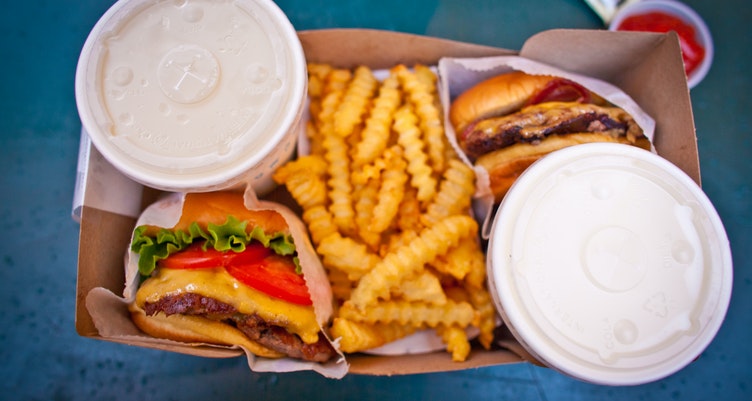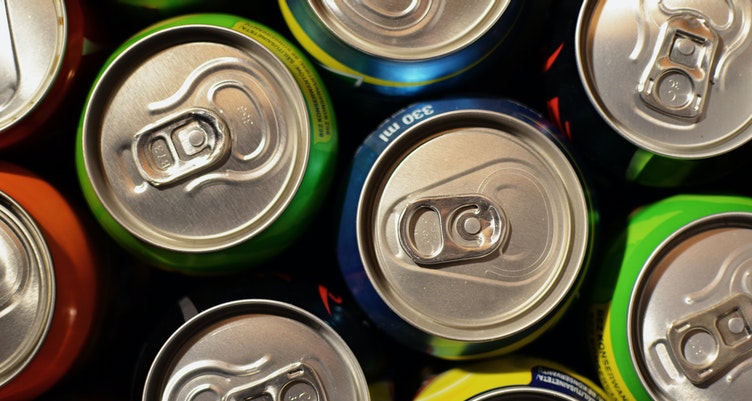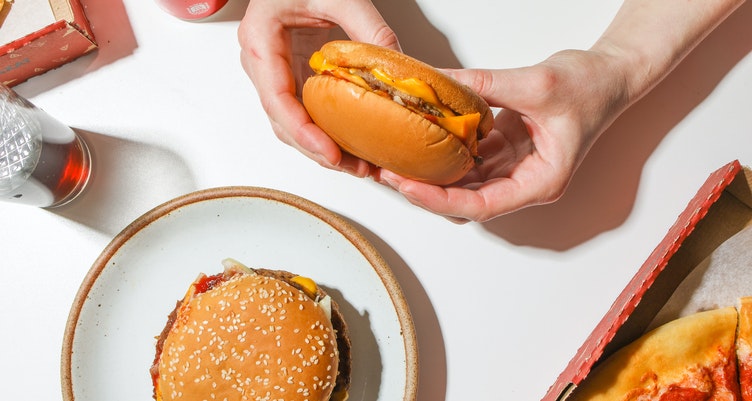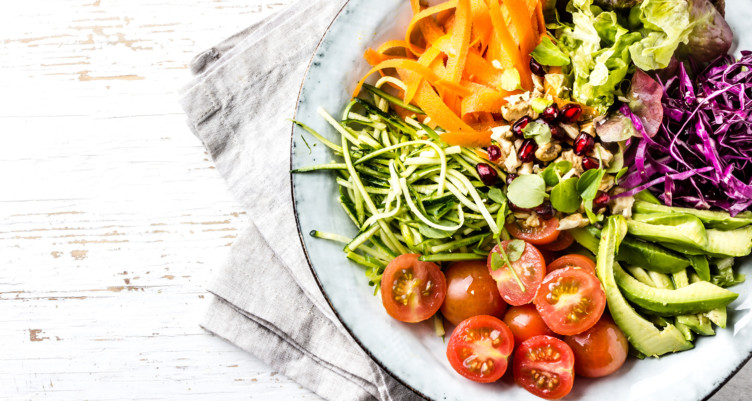6 Inflammatory Foods to Avoid and What to Eat Instead
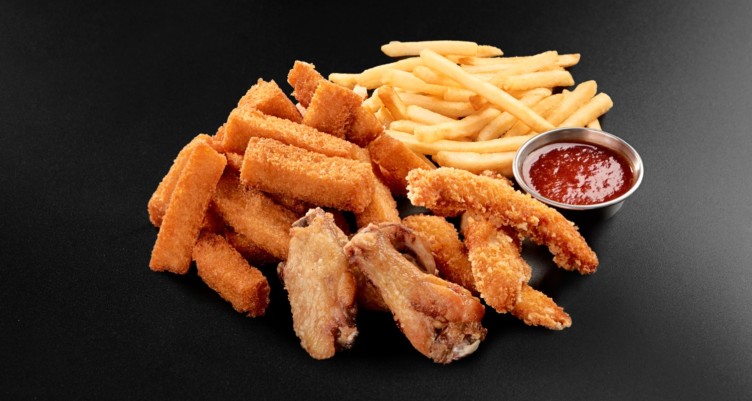
- What you eat can contribute to inflammation in your body. How do you know what to avoid?
- Some of the most common foods and most delicious items on the menu can trigger an inflammatory response. Left unchecked, inflammation can lead to stress, fatigue and even chronic disease.
- To help manage healthy levels of inflammation, follow this list of inflammatory foods to avoid—and learn what you can add to your diet to help you feel your best.
What are inflammatory foods? We all know that some foods aren’t great for you. Unfortunately, the list of inflammatory foods to avoid includes delicious favorites like fried chicken and pizza. One of the reasons to avoid eating these foods all the time is that they promote inflammation, which can be damaging to your long-term health.
Chronic inflammation is called the “silent killer” because it can lead to inflammatory diseases like heart disease, type 2 diabetes, rheumatoid arthritis, obesity and even early death. You don’t have to follow a full-blown anti-inflammatory diet or follow an anti-inflammatory foods list to a T, but there are some easy steps you can take to reduce your overall inflammation and improve your health and wellness, including limiting certain foods known to cause inflammation. Keep reading to know which inflammatory foods to avoid and how certain foods and supplements—including Omega Krill Complex, Curcumin Max and Turmeric Gummies—can support a healthy inflammation response.
Inflammatory foods to avoid

Want to manage inflammation levels better? It starts with your diet.
Before we dive deeper into the anti-inflammatory foods you should have in your pantry (and fridge), let’s take a closer look at inflammatory foods to avoid.
1. Fried foods
Restaurants, fast food chains and packaged foods companies tend to use hydrogenated oils, margarine and shortening to get a perfectly crisp French fry or piece of fried chicken. These fats contain trans fatty acids and can cause inflammation of the endothelium, the thin inner lining of your heart and blood vessels.[1]
Your entire circulatory system is lined with these cells, which manage the exchange of nutrients and toxins between nearby tissue and the bloodstream. Inflammation of the endothelium is associated with a long list of inflammatory diseases, including heart disease, diabetes and insulin resistance.[2]
There’s clear science that backs this up. In a study of more than 100,000 women, those who ate a daily serving of fried chicken were 12% more likely to die from heart-related health issues. and those who ate fried fish or shellfish daily were 13% more likely to die from the same causes.[3]
Do this instead:
- The most healthful choice is to avoid fried foods. You can still achieve delicious results with other cooking methods, like baking and using an Air Fryer.
- If you’re going to eat fried foods, opt for quality, high-heat cooking oils like ghee or avocado oil. These fats have a better fatty acid profile than vegetable oil or canola oil.
- This recipe for Crispy Paleo Tostones is a great example of how you can fry (or bake!) foods to enjoy occasionally at home.
Related: 4 Healthy Fats for High-Heat Cooking
2. Sodas
Even if you avoid artificial sweeteners, the amount of added sugar in regular soda is enough to cause your body to feel puffy. A single 12-ounce can of cola contains almost 10 teaspoons of sugar. As your body processes glucose (also known as blood sugar), it will store at least 3 grams of water for every gram of glucose—hello, water-weight.[4]
And just like trans fats, fructose (another type of sugar) can cause inflammation of the endothelium. Here’s an article that goes deeper into how excess sugar puts your body through the wringer.
Do this instead:
- Cut back on soda. If you do drink, avoid sodas made with artificial sweeteners.
- If it’s the carbonation you crave, try sparkling water flavored with natural fruit essences like La Croix, Waterloo and Spindrift.
- Whip up a flavorful drink at home with these recipes: Matcha Soda, Basil Lemonade or Keto Raspberry Thyme Gin Fizz (hold the gin to make it a mocktail)
3. Refined carbohydrates
White bread, pizza dough, pasta and pastries are often made with white flour—wheat flour that’s been through a process that strips out the fiber and bran. This process takes much of the nutrients with it and leaves behind the carbohydrates.
Your body quickly breaks down refined carbohydrates into sugar, exposing you to the same inflammatory risks caused by added sugar mentioned above. One study of healthy male subjects found that eating a high-carb meal caused a glycemic spike. The following insulin response led to a state of oxidative stress that produced inflammation.[5]
Your body’s metabolic processes are optimized to break down whole foods. That means when you eat a bunch of refined carbohydrates, you’re cheating your gut microbiota of the benefits it gets from breaking down complex carbohydrates—such as managing inflammation and loading up on fiber.
A study found that when your gut microbes go through the time-intensive process of separating cellulose from the simple carbohydrate, they actually consume some of the glucose. This keeps your body from producing the insulin spike it gets from consuming refined carbohydrates.[6]
Do this instead:
- Avoid foods made with refined flour, such as white bread, pastries, packaged snacks and pasta.
- If you eat grains, opt for whole grains like quinoa, buckwheat and oats. Keep in mind that grains don’t work for everyone and can actually contribute to inflammation on their own, so pay attention to how you feel after eating them.
Related: The Complete Bulletproof Guide to Gluten and Grains
4. Ultra-processed meats
Processed meats (think: hot dogs, canned meats and sausages) are often preserved with nitrates (NO3) and nitrites (NO2). These are simple organic compounds made of nitrogen paired with two or three oxygen atoms. In the process of digestion, nitrates typically lose an oxygen molecule (adding to your body’s oxidative stress) and become nitrites.
Nitrites are the same molecules found organically in vegetables like spinach, kale and cabbage. However, scientists have found that these compounds transform into dangerous nitrosamines when they are cooked in the presence of protein. These nitrosamines generate oxidative stress and inflammation.[7]
Even meats labeled as “uncured” or “no nitrites added” contain nitrites. These foods get their nitrites from celery, beets or another natural source that is used in the curing process.[8] Whether sourced from nature or from man-made sodium nitrite, the molecule is the same — and when cooked with meat, it’s just as inflammatory.
Kate Allen, executive director of science and public affairs at the World Cancer Research Fund, said in an article published by BBC that nitrites are just one reason processed meats pose a health risk. Smoked meats also include PAHs (polycyclic aromatic hydrocarbons) and HCAs (heterocyclic amines), which both promote cancer.
Do this instead:
- Cut back on processed meats, and when you do eat them (like bacon), eat pasture-raised varieties from reliable sources.
- When you cook your pasture-raised bacon, minimize oxidation by cooking it at lower temperatures — i.e. don’t burn it.
5. Margarine and shortening
Butter is full of quality fats, which is why it’s a key player in Bulletproof Coffee. If you grew up thinking that margarine and shortening are healthier choices, the reality is that until recently, these rich foods were made of trans fats—and trans fats present the same inflammatory threats we covered earlier with fried foods. Because the FDA has recently required manufacturers to remove the greatest source of trans fats (Partially Hydrogenated Oil, PHO) in foods, read your label to make sure you are not eating products that are still made with this outdated and unhealthy ingredient.
Do this instead:
- Cook with quality fats like grass-fed butter, Bulletproof Grass-Fed Ghee, grass-fed beef tallow or lard from pasture-raised pork.
- Lard might be surprising, but in reality, it has nearly twice the monounsaturated fat (one of the healthy fats) as butter. It’s easy to cook with because it doesn’t smoke at high temperatures. It’s also the key ingredient in the perfect tortilla or these Crispy Keto Cauliflower Tots.
6. Alcohol
Ever felt a little puffy after a night out? Alcohol leads to inflammation in your body in two ways.
- First, alcohol causes DNA damage to your body’s cells, which engages an inflammatory response as the cellular clean-up crew arrives.
- Second, the damage to the liver causes inflammation, abdominal swelling and bloating, as well as a host of other negative effects.
The bad news is that if you drink too regularly, your body remains in a heightened state of inflammation which can contribute to chronic disease. Read more about how alcohol affects your immune system.
Do this instead:
- Learn how to navigate better-for-you options with the Bulletproof Alcohol Guide.
- And if consuming alcohol does not sit well with your body, simply avoid it altogether.
Anti-inflammatory foods list
An easy way to fight inflammation is to eat in a way that actually supports a healthy inflammation response in your body. There are a few ways to do this:
Eat high-quality foods
Fill your plate with high-quality foods like grass-fed meats, leafy greens and other unprocessed veggies, healthy fats and fatty fish like mackerel and sardines. On top of the anti-inflammatory health benefits, these foods are also delicious and can help improve your overall wellness.
Follow a keto diet
A high-fat, low-carb ketogenic diet can help support a healthy inflammation response. To get started, read this Guide to the Keto Diet for Beginners.
Get more omegas in your diet
Load up on vegetables and fruits that contain omega-3 fatty acids, antioxidants and compounds with anti-inflammatory effects—think cold-water fish, dark leafy greens, berries and spices like ginger, rosemary and turmeric. These foods that are rich in omega-3s can help you reach a healthy ratio of omega-3 to omega-6 fatty acids, which are often found in higher amounts in non-grass-fed red meats.
Consume more superfoods
Superfoods like fresh fruits and vegetables can help fight inflammation. Instead of eating them as a stand-alone snack, try adding some low-carb, organic berries and lots of colorful veggies to your meals for a fresh, vibrant punch of nutrition and flavor!
Take supplements
In addition to food, certain supplements can actually help support a healthy inflammation response. Omega Krill Complex provides heart, brain, and joint support via a unique blend of omega-3 krill oil, Norwegian herring roe and Atlantic and Pacific fish oils.
For those looking for a recovery supplement that supports a healthy inflammation response, Curcumin Max or Turmeric Gummies can be taken before or after an intense workout. Ingredients like stephania, ginger, and boswellia provide a complementary effect to the turmeric and curcumin complex. Plus, this supplement also contains Bulletproof Brain Octane C8 MCT Oil, which helps support the absorption of fat-soluble compounds.
Sign up for early access to sales, product launches, the latest Bulletproof news and more!
